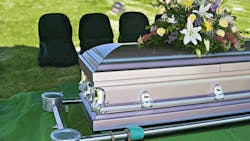Families of Workplace Fatality Victims Struggle to Pay Funeral Costs
When Kim Flynn was hit by the devastating news that her daughter, a social worker, was murdered at work, the last thing on her mind was financial matters. Yet with a short window to plan a funeral, Flynn quickly received another shock: the funeral costs were more than twice the maximum $4,000 coverage provided through workers’ compensation.
“The wake alone for Stephanie was $7,800. We had to cremate her to save costs,” said Flynn in written testimony submitted before the state’s Joint Committee on Labor and Workforce Development. “We had to hold a fundraising event to pay for the funeral costs.”
Joining a group of impacted families, workplace safety experts and legal association leaders, Flynn encouraged the Massachusetts legislature to pass a bill, the Families of Fallen Workers Burial Act, that would increase burial benefits under workers compensation to ensure that other families will be able to afford to bury their loved ones.
According to the 2010 funeral price survey by the National Funeral Directors Association, the average funeral cost for an adult funeral is $7,775. With cemetery plot, grave marker, flowers or obituary notices, the “regular adult funeral” cost is at least $9,000. Proposed legislation providing for burial benefits under workers’ compensation (H1698, SB866) would increase the benefits allotment from $4,000 to $8,000.
“The loss of a loved one is hard enough on a family without having to worry about burial costs,” said Senator Brian A. Joyce, the Senate lead sponsor. “When a worker loses his or her life on the job, the families left behind deserve enough compensation to put their loved one to rest and begin to heal.”
Deaths Are Emotionally and Financially Devastating
“We hear stories of husbands, wives, fathers and mothers, who on a moment’s notice are suddenly thrust in the position of needing to find several thousand dollars to ensure that they can bury their family member,” testified Marcy Goldstein-Gelb, executive director of the Massachusetts Coalition for Occupational Safety and Health. “This bill will ensure that no family has to shoulder the financial burden of a burial. The increase adds up to very little for the workers’ compensation insurance system – and will mean a huge difference for families in mourning across the commonwealth.”
Melissa King spoke of her family’s experience after her father was electrocuted while working at Logan Airport in 2005. “Workers’ comp did not even come close to covering the [funeral] costs,” said King. “My mom was too devastated to continue working and had to leave her job. I had to quit my job in Rhode Island and come home and take care of my family. Being able to at least cover the costs of my father's funeral would have been one less thing to worry about during such an awful time in our lives.”
In Massachusetts, the burial benefits allotment under workers’ compensation has remained at $4,000 for decades. Burial benefits in several states are substantially higher than Massachusetts, including Georgia, Florida, Indiana, Louisiana and New Mexico ($7,500); Illinois ($8,000); North Dakota ($10,000); and Minnesota ($15,000).
“An increase in the burial benefits allowance is long overdue,” said Representative Garrett Bradley, the House lead sponsor. “Families that suffer such a tremendous loss should not be saddled with the additional burden of worrying about paying for funeral arrangements.”
Marsha V. Kazarosian, president-elect of the Massachusetts Bar Association, said that doubling the burial benefit to $8,000 will go far to alleviate the financial burden for families who are faced with the sudden death of a loved one. “Support for working families should not end when someone dies on the job; that’s precisely when they need it the most,” she added, a sentiment echoed by Judson Pierce, chair of the Workers’ Compensation Committee at the Massachusetts Academy of Trial Attorneys.
“It is time that a loved one who has passed at the workplace be given a funeral that is in line with what it actually costs to bury someone,” said Pierce. “It is time to acknowledge that this is not only morally responsible, but it is simply the right thing to do. It is time to pass the Families of Fallen Workers Burial bill.”
About the Author

Sandy Smith
Sandy Smith is the former content director of EHS Today, and is currently the EHSQ content & community lead at Intelex Technologies Inc. She has written about occupational safety and health and environmental issues since 1990.
